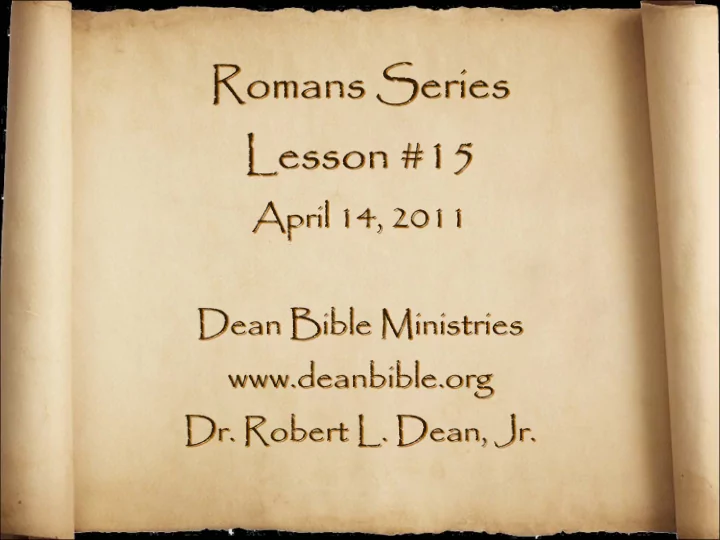

The Epistle to the ROMANS
Rom. 1:18, “For the wrath of God is revealed from heaven against all ungodliness and unrighteousness of men, who suppress the truth in unrighteousness, Rom. 1:19, “because what may be known of God is manifest in them, for God has shown it to them.” Human Soul GOD GOD
Rom. 1:20, “For since the creation of the world His invisible attributes are clearly seen, being understood by the things that are made, even His eternal power and Godhead, so that they are without excuse.”
Two Categories of Revelation
Revelation General Revelation: The nonverbal disclosure from God as contained in His works of creation and providence, i.e., the universe, a molecule, a flower, the design of a giraffe’s brain. Special Revelation: The direct, verbal self-disclosure of God to His creatures, i.e., a theophany, the Scriptures, non-recorded verbal communication to mankind.
Jer. 17:9, “The heart is deceitful above all things, and desperately wicked; who can know it?” Eccl. 9:3, “This is an evil in all that is done under the sun: that one thing happens to all. Truly the hearts of the sons of men are full of evil; madness is in their hearts while they live, and after that they go to the dead.”
Rom. 1:20, “For since the creation of the world His invisible attributes are clearly seen, being understood by the things that are made, even His eternal power and Godhead, so that they are without excuse.”
What is man’s basic problem? Is it– spiritual (ethical/righteous) intellectual social education?
Autonomous Systems SYSTEM METHOD STARTING POINT RATIONALISM Innate ideas; Independent use of of Perception Faith in human logic and reason ability EMPIRICISM Sense perceptions; Independent use of External experience; logic and reason Scientific method; Faith in human ability MYSTICISM Inner, private Independent, experience; Intuition; nonlogical, Faith in human ability nonrational, nonverifiable. Viewpoint Divine REVELATION Objective Dependent use of revelation of God logic and reason
��������������������������������� �������������������� ��������������������� �������������������� ������������������ ��������������������������� ���������������������� ������������������ ������������������������� ������ ������� ����������������� �������������������������� ��������������������������� � �������������������� ����������� �������������� ����������������������� ��������������������� �������� �����������������
C OMMON G ROUND What authority is common to both? Reason Experience Intuition Believer Unbeliever committed to committed authority of to unbelief Scripture
Arguments for the Existence of God 1. The Cosmological Argument: Cause-effect 2. Presuppositions • every effect has a cause • the effect caused, depends on the cause for its existence • nature cannot originate itself 3. If something now exists (the universe) then it either came from nothing or it came from something that must be eternal. The something eternal could either be the universe itself which would then have to be eternal, or chance as an eternal principle, or God, the eternal Creator who is Being itself.
Arguments for the Existence of God (a) Some limited, changing being(s) exist. To deny this requires an affirmation from an existing being, so it is self-defeating. (b) The present existence of every limited, changing being is caused by another. The potentiality for existence can only be actualized by some existence beyond it. (c) There cannot be an infinite regress of causes of being. (d) Therefore, there is a first Cause of the present existence of these beings. (e) This first Cause must be infinite, necessary, eternal, simple, unchangeable, and one. (f) By comparing the Being supported by this line of argumentation with the God of the Scriptures, we conclude they are identical.
Arguments for the Existence of God 1. An infinite number of moments cannot be traversed. 2. If an infinite number of moments had to elapse before today, then today would never have come. 3. But today has come. 4. Therefore, an infinite number of moments have not elapsed before today (i.e., the universe had a beginning). 5. But whatever has a beginning is caused by something else. 6. Hence, there must be a Cause (Creator) of the universe.
Arguments for the Existence of God 1. The Teleological Argument: Design, purpose, 2. Presupposition: Order and purpose are observable in the universe. 3. Not only do the macro systems of the universe display order, purpose, and integration, but so do the micro systems of the universe: DNA, protein, snowflakes, etc. Chance could not account for this. Only an infinite, omniscient Designer could account for the universe.
Arguments for the Existence of God 1. Moral laws imply a Moral Law Giver. 2. There is an objective moral law. 3. Therefore, there is a Moral Law Giver.
Arguments for the Existence of God 1. The Ontological Argument: Based on understanding the meaning of “being” or existence itself. (Anselm, Descartes) (a) we have an idea of a Most Perfect Being; (b) the idea of a Most Perfect Being includes existence, since a Being, otherwise perfect, who did not exist would not be so perfect as a Being who did exist; (c) therefore, since the idea of existence is contained in the idea of the Most Perfect Being, that Most Perfect Being must exist 2. Where does the idea of God come from?
Recommend
More recommend